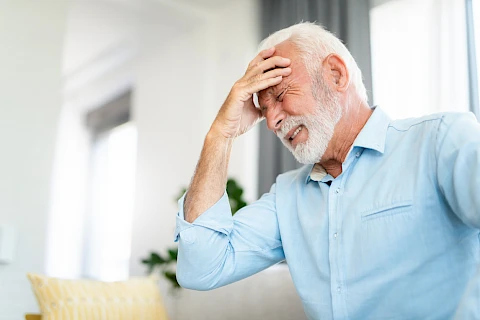
May is a time for blooming flowers, warmer weather, and, Stroke Awareness Month. This annual observance serves to highlight the significant impact strokes have on our communities, particularly among our senior population.
Senior Helpers Northeast Atlanta understands the role awareness and preparedness play in the event of a stroke. We will equip caregivers with the knowledge necessary to recognize the signs of a stroke, an action plan for responding to a suspected stroke, and the best ways to comfort a loved one while help arrives.
What is a Stroke?
A stroke is a medical emergency that occurs when the blood supply to a part of the brain is cut off, resulting in damage to brain cells. There are primarily two types of strokes: ischemic strokes caused by blood clots and hemorrhagic strokes caused by bleeding in the brain.
Both are equally severe and require immediate medical attention. According to the American Stroke Association, someone in the United States has a stroke every 40 seconds, with seniors being particularly susceptible.
Recognizing the Warning Signs of a Stroke
Stroke symptoms usually manifest suddenly. One of the easiest ways to remember the tell-tale signs is through the acronym F.A.S.T, which stands for Face drooping, Arm weakness, Speech difficulty, and Time to call 911.
If you observe any of these symptoms in your loved one, seek emergency medical services immediately. Other warning signals may include trouble seeing with one or both eyes, difficulty walking, and severe headache. Prompt recognition and response can drastically improve the outcome for your loved one.
Caregiver Action Plan in Case of a Suspected Stroke
As a caregiver, your response could be the difference between life and death or between a full recovery and long-term disability. When a suspected stroke occurs, first and foremost, call 911. Even if the symptoms seem to improve, emergency medical attention is still necessary.
While waiting for paramedics to arrive, try to keep the individual calm and reassured. Maintaining a supportive and quiet environment can help minimize additional stress, which could exacerbate the situation. If possible, note when the symptoms first appeared, as this information can be crucial for medical professionals.
Post-Stroke Care
The aftermath of a stroke can be as challenging to navigate as the event itself. Stroke survivors can experience various after-effects, from physical and cognitive difficulties to emotional changes. Your role is vital in supporting the recovery and well-being of your loved ones post-stroke.
At Senior Helpers Northeast Atlanta, we understand that this responsibility can seem overwhelming. That's why we offer comprehensive post-stroke care services tailored to meet the unique needs of stroke survivors. Our team of professional caregivers assists with daily tasks, therapeutic activities, and emotional support—helping seniors regain their independence and improve their quality of life.
Contact Senior Helpers for Stroke Awareness Services
Understanding and reacting to the signs of a stroke can significantly impact a senior's health and recovery. During Stroke Awareness Month, it's important to remember the vital role caregivers play in identifying stroke symptoms and taking quick action.
If you're in Cumming, Duluth, Suwanee, Norcross, or Peachtree Corners, contact us at Senior Helpers Northeast Atlanta. We proudly provide custom senior care services and support.